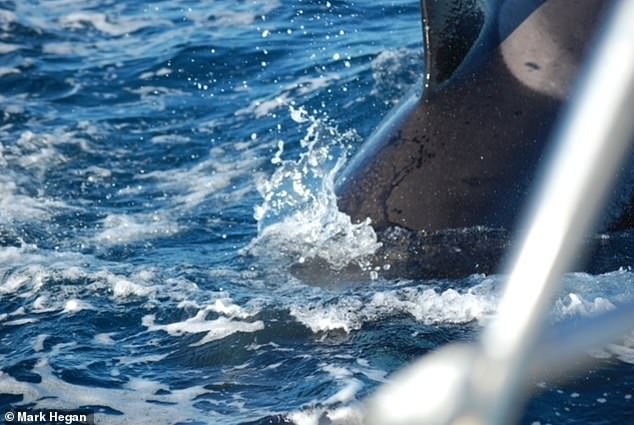An experienced British yachtsman and businessman has recalled a vicious attack by a pod of orca that left his boat with £15,000 of damage.
In an interview with the Daily Mail, the 71-year-old has exclusively recalled his ’45 minutes of turmoil’ during an orca attack in the Strait of Gibraltar in June 2024.
Mr Hegan says his Swan 391 sailboat was pounded by a ‘pod’ of four killer whales, also known as orcas, while travelling eastwards towards the famous Strait.
The ‘surreal’ repeated attack, resulting in £15,000 of damage, left him and his crew fearing their 40-foot vessel would sink.
Orca attacks on boats tend to occur off the coasts of Spain and Portugal, particularly near the Strait of Gibraltar and the Bay of Biscay.
But Mr Hegan thinks the number of attacks in the region are being misreported or downplayed, so as not to frighten away tourists.
‘It was a coordinated attack lasting about 45 minutes by four orca,’ Mr Hegan told the Daily Mail.
‘It is clearly a bigger problem that the authorities are playing down so not to disrupt tourism.’

A yachtsman and businessman has recalled his ’45 minutes of turmoil’ during an orca attack in the Strait of Gibraltar last year

One crew member managed to take photos of the orcas, which live in closely-knit family groups known as ‘pods’
It was June 20 last year that the yachtsman and his family set sail from Cascais, near Lisbon on the Portuguese coast, bound for Gibraltar.
The day they set off, they’d already heard of an orca attack about 30 miles south of Lisbon, where a catamaran had lost one of its rudders.
‘We were fairly reassured by this as we were already south of the position and felt the orca pod was probably further north,’ he told the Daily Mail.
‘We also understood from reading articles that only about one per cent of boats had orca encounter.’
Two days later, on June 22, the four-person crew were approaching the Straight of Gibraltar – the 10-mile wide stretch of water separating Europe and Africa.
As they were sailing just west of the Strait, the first cause for real concern arrived, at around 5:45am as the day broke.
The crew received a Mayday call from a yacht being attacked by orca about five miles southwest of their position.
‘The radio caller was in a real panic and clearly very frightened,’ Mr Hegan said.

Despite often being referred to as ‘killer whales’, orcas are actually the largest member of the dolphin family

Damage to Mr Hegan’s boat was about £15,000 (rudder and self-steering), although fortunately the insurance paid for a lot if it
Just a couple of hours later, Mr Hegan’s son who was steering the boat spotted orcas close, shortly followed by a ‘loud bang’ against the hull.
Mr Hegan immediately sent an urgency signal on Channel 16 VHF, the marine radio frequency designated as an international distress frequency.
‘The coastguard switched me to Channel 71 and said he would stay in continuous contact while the attack continued. He told me to keep checking the rudder mountings to make sure not water was coming in,’ he said.
‘Our position was logged and he said rescue craft would be sent if we needed them.’
The coastguard also told him to try to get to shallow water, but this was ‘easier said than done’.
The initial loud bang was followed by repeated impacts on the rudder and hull – a ‘coordinated attack’ by what he counted to be four orcas.
‘One approached the stern of the boat turned upside down and grabbed the rudder in its mouth we think, while a second repeatedly approached at high speed and hit the rudder from each side,’ Mr Hegan added.
‘Five tons of orca hitting the boat has a real impact!’

Orcas called ‘killer whales’ even though they are dolphins. The animals are the apex predators of the ocean, and are known to prey on a wide variety of species, including the calves of humpback and grey whales (stock image of orcas)
Finally, after ’45 minutes of turmoil’, the orcas left and the crew headed for the coast and shallower water, only giving up when they had ‘done the damage to the rudder’.
Amazingly, despite the ferocity of the attack, there was fortunately no water ingress, and the £15,000 in damage was largely paid for by insurance.
Mr Hegan said his boat is still marooned at La Linea near Gibraltar Airport and he hopes ‘to get her home next summer’.
‘Hopefully the authorities will come up with a solution [to the orca attacks] by then,’ he said.
Orcas, Mr Hegan said, have a lot of protection, but this means crews are risking their boats and possibly even their lives to traverse the water.
‘The authorities have talked about tagging them so we know where they are to avoid them,’ he added.
‘No one wishes the orca unnecessary harm but there seems to be a lot of underreporting of the problem.
This article was originally published by a www.dailymail.co.uk . Read the Original article here. .

